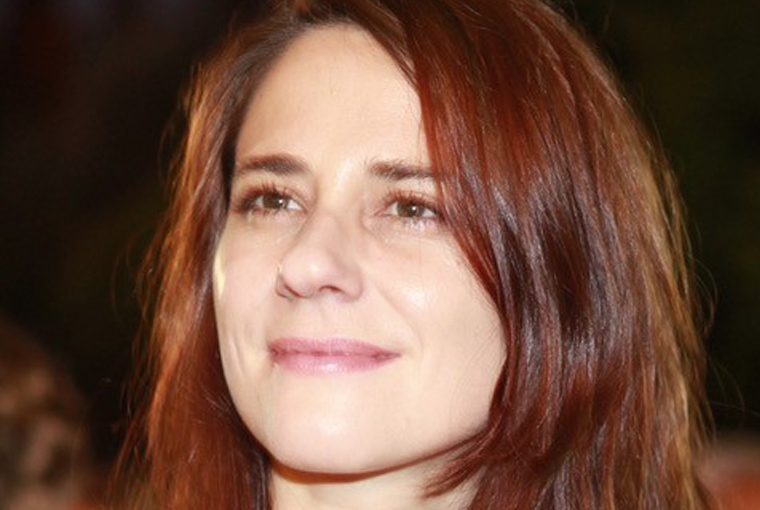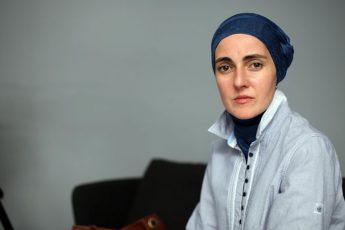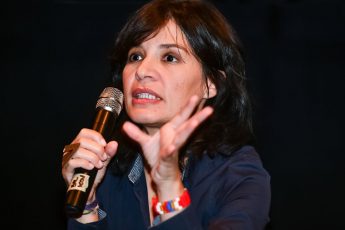
What made you do films?
I studied international relations in Geneva and then I went to New York for an intensive course for year and then I studied in FAMU. So I have an eclectic background. I left Romania when I was 15, as my parents moved to Switzerland. I went back when I was 19, and made my fist short film in 2003.
Was it easy to make that film?
Actually, I found the money to produce the film in Switzerland. I also knew Catalin Mitulescu who was a childhood friend. He put together the crew and was the executive producer. This was very helpful. But I had a Czech D.o.P. and a Czech scriptwriter.
Having spent a lot of time abroad, and having worked with an international crew, in what way is the foreigner reflected in your films?
That’s what I was living. It came from my experience. Actually, we included the foreigners for financial reasons, to have a “Western” element. Only later I realized that it is part of my biography.
The foreigner is ambiguous though: he offers something good (education, parenthood), but harms someone (Ryna, and the brother).
It’s a dream, an idealization of something different: economically, politically, socially. As an emigrant you might gain freedom, but you always loose something: culture, roots, identity.
On a larger political scale, is this a metaphor for Romania’s inclusion in the EU?
Yes. But this was not intended.
Do you think by constructing plot-lines made for a “European audience” you are undermining your liberty as an artist?
Well, take Kusturica whose films are made for the people. They are so popular, it’s amazing. You can’t find a European director at once so popular and still so artistic. In the end, you must be true to yourself. You must be independent from the market. So if you construct plot-lines for a “European market”, yes, in a way you limit your artistic liberty. I don’t know what Vera Chytilová thought when she made Daisies. She surely didn’t think that she made her film for a specific audience, otherwise it wouldn’t have been so good.
So why think about a European audience?
Well, you must do a film for an audience. Even for Daisies, she must have thought that there will be a reaction to her film. For example, my next film, I know already that it will not be a commercial film, but it has some sort of “Art House” signature. I try to be true to what I feel and then I might introduce elements that help to make the plot-line larger. So I don’t think I betray myself introducing these elements. Also, the competition for distributing films in art house cinemas is so huge. In Geneva there is one art house cinema left. How can you have an audience if you don’t have the cinemas? So you have to fit in some pattern to ensure that you have an audience at all.
Is the mayor, who rapes Ryna, the only person who turns her into a victim?
No. I think it is quite clear that all the people around her don’t allow her to express her identity. They are all responsible for the rape, the father, the Frenchman, the postman. Ryna embodies what the other character’s put into her.
Would you describe Romania as a sexist country?
I don’t know. But in some rural areas it’s probably a “man’s world,” a paternalistic society.
How do you feel, as one of the very few women director’s belonging to the new Romanian cinema?
The film world in Romania is quite male dominated. In France and Switzerland there are a lot more successful women directors. But this will surely change. In a few years there will be a bunch of great Romanian women directors.
Most recently you produced a film – “The Childhood of Icarus”. How was it to switch sides?
I wasn’t alone in the production. Dan Bolag was with me. But it’s very hard to produce. It’s a very political job. I learned with the New Wave, Mitulescu, Mungiu, all these people that produce their own films, that directors are the best producers. They know how to write a screenplay, they know how to make a casting, they know how to choose the best technical material. This is what makes a good producer, not only the financial part.
Do you think there’s a need for more commercial films? Romanian films that stay in Romania?
It’s funny, we just talked with Mircea Dan Duta – the director of the Romanian Cultural Institute in Prague – saying that somehow these non-commercial “New Waves” are always succeeded by more commercial films. For example, why is there no “New Wave” in the Czech Republic going on now? I mean Porumboiu, Puiu, Mungiu they just had something to say, without thinking too much about the commercial aspect of what they were doing.
Thank you for the interview.
The interview was conducted by Moritz Pfeifer and Ana Ribeiro




Leave a Comment